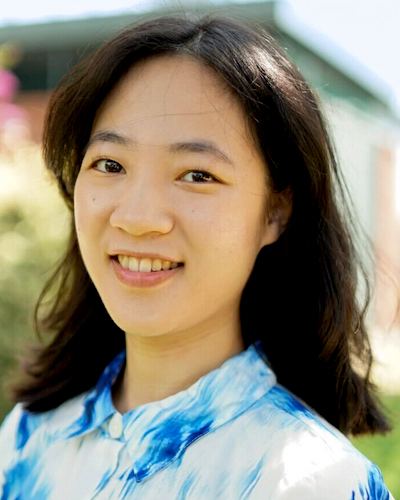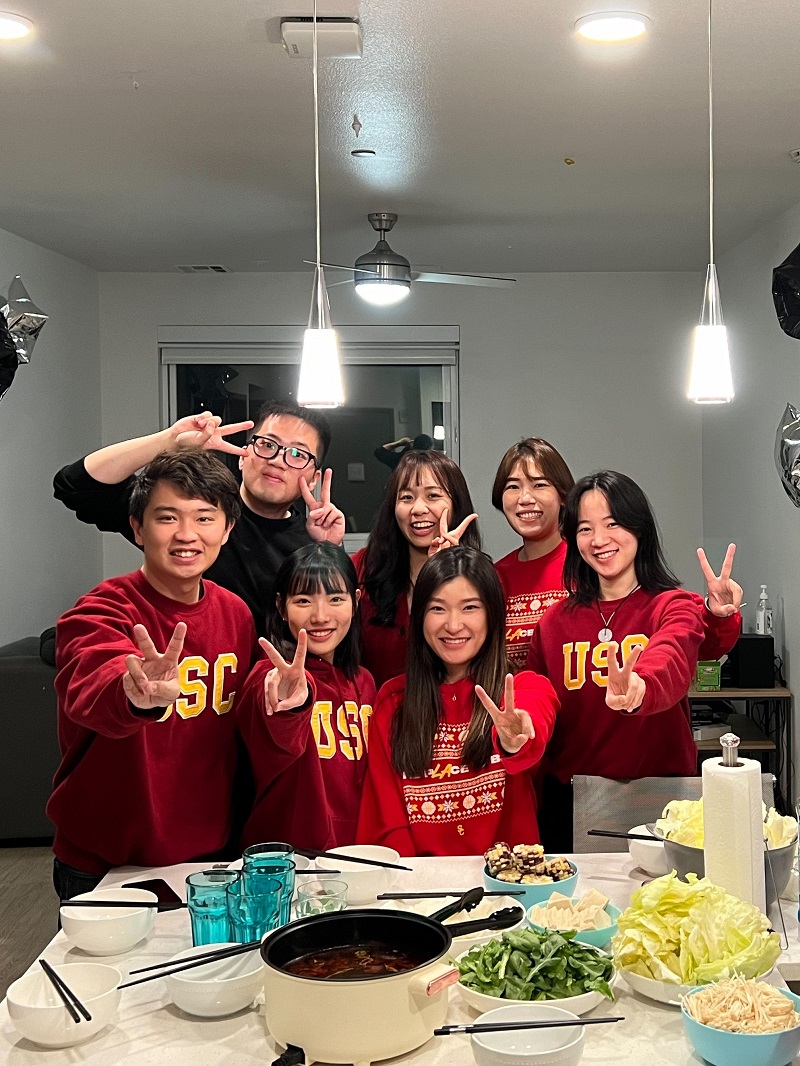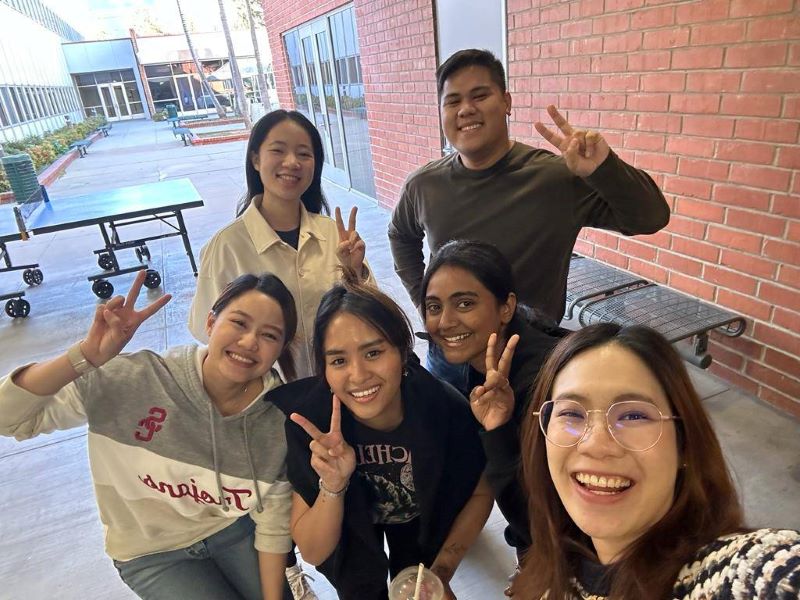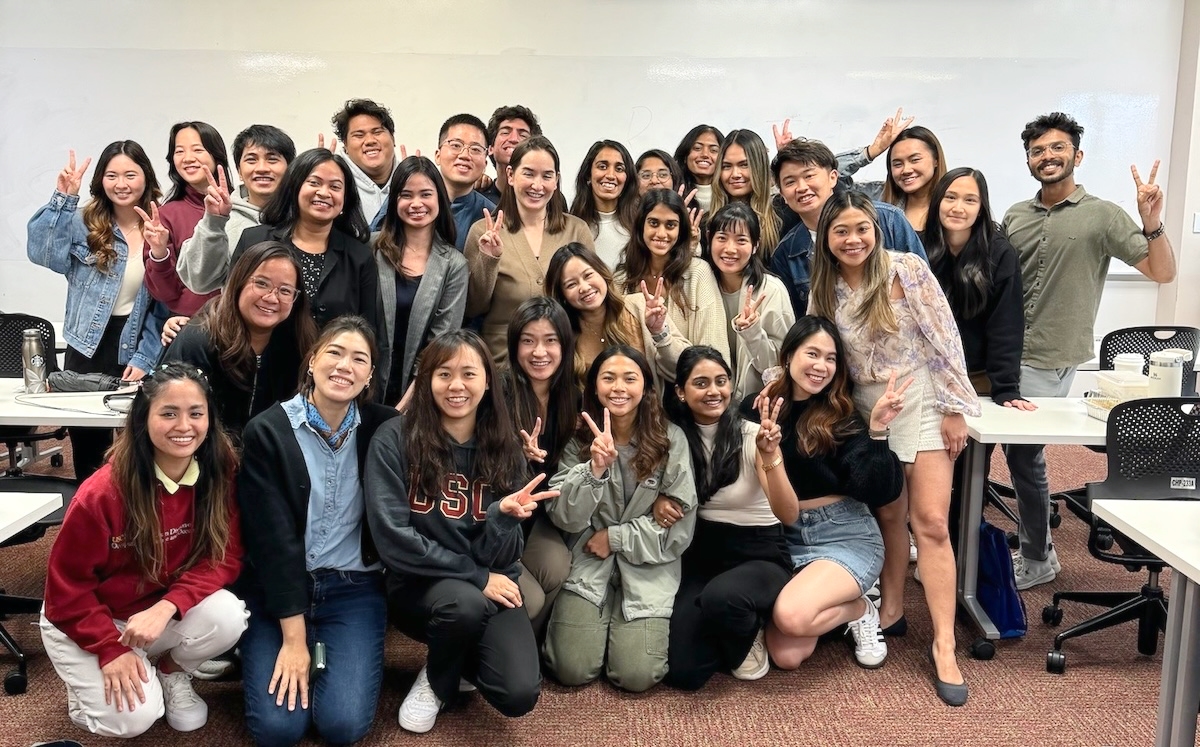Student Blog
Cindy

Some Things We Learned . . . ⟩
May 17, 2024, by Cindy
It is already May. I cannot believe I am graduating from the Post-Professional Master’s (PP-MA) program! I remember all my doubts about accepting the offer to the PP-MA program at USC Chan. I was unsure if leaving everything I was familiar with was the right choice. However, I wanted to pursue the OT profession and life further. I still remember the excitement and nervousness I felt on the orientation day. These two semesters were filled with participating in lectures, doing assignments, group discussions, and exploring life in a foreign country. With all the small steps we took, we have come so far. We know taking on this journey can seem intimidating. That’s why my classmates and I would like to share what we learned after nine months of navigating through grad school and life with you:
- “We are fortunate to have the chance to make positive changes in our lives or careers, so seize it with enthusiasm!” — Sherry Shang, Taiwan
- “Trust the process and enjoy it. It will all be worth it in the end.” — Briana Orteza (Philippines)
- “Stay curious and enjoy the journey ahead of you!” — Ann Chen, Taiwan
- “Make sure to build connections and enjoy every moment of the program because it’ll pass by QUICK. Also study haha and remember the purpose you’re here . . . ‘To make a change’.” — Pranav Bharat Dalvi, Mumbai, India
- “Find a great support system, and don’t forget to balance school and leisure 😊” — Sophia, Philippines
- “Being a foreigner in the US can be daunting and might cause some uneasiness to socialize. But you got this. Join organizations even if it means going to UPC. The friends I’ve made in the USC Dragonboat, SC Esports and Dungeons and Trojans are invaluable both emotionally and career wise, I feel I’ve setup several career paths by just making friends. Being a Trojan is part of your resume if you plan to stay.” — Topher Lumibao, Laguna, Philippines
- “Don’t be afraid to share your thoughts to the teachers and classmates! You will learn so much more!” — Roger Lo, Taiwan
- “Enjoy your time here! It’ll over before you know it 🙁” — Vera Kwok, Hong Kong
- “Even if it feels confusing at first, remember that the journey will be rewarding because OT didn’t just become your choice, OT chose you. ❤️” — Sanskruti P Sonawane, India
- “Stay Open to opportunities and view each experience, whether positive or negative, as a chance to learn. Embracing this perspective is key to personal growth, and remember to enjoy the process along the way!” — Beni, Phillippines
- “Don’t let anyone else define success for you.” — Vurshali, India
- “Remember, it’s not just reaching your destination that matters, but embracing the journey along the way. So, take a moment to savor life as you pursue your goals.” — Polyanna, Philippines
- “I’d like to say that please don’t be afraid to ask for help. You just need to voice your concern and help is there for you. Everyone is really supportive at Chan Division.” — Archie, Australia
- “You are here for a reason. Trust the process; it will all make sense one day.” — Nicole, Philippines
- “When things looks like they are falling apart, remember: looks can be deceiving! Do your best and don’t forget to have fun! You’ve got this!” — Ahmed Nader, Saudi Arabia
- “Enjoy diving into the limitless OT journey during your USC life! Fight On!” — Jasmine, Taiwan
- “Plan ahead and live in the moment. Search for opportunities and seize them.” — Yung-Hisn Chang, Taiwan
Whether you are thinking about taking on this journey, are preparing to start the journey, or in this journey, we hope that the things we learned can be an encouragement and reminder to you. Yes, you might find obstacles, challenges, and even tears along the way. However, you will gain new skills, knowledge, perspectives, friends, and growth you cannot find anywhere else. Doing all the tasks to go through the program has allowed us to become the professionals we have strived to be. After this year, I would like to tell the anxious me a year ago: “This will be more meaningful to your profession and life than you can imagine. You will not regret this!”
⋯

Academic Differences I Found and How I Adapted ⟩
March 26, 2024, by Cindy
As a practicing occupational therapist from Taiwan, I was worried about stepping into a master’s degree program in the US. I did not know what to expect and how to prepare for the context transition. Therefore, I would like to share some academic differences I experienced. I also want to share some strategies and resources that helped me.
Difference:
- Interactive classes vs. lecture-oriented classes: The classes I attended were mostly lectures during my undergrad. Now, I find most PPMA classes are designed to let us learn by interacting with classmates and instructors. There are often in-class discussions or practices. I enjoyed those discussions, and I learned so much through them. However, I still find myself hesitating to raise my hand to answer questions or share my thoughts during group discussions.
- Critical analysis rather than one answer: The learning objectives behind the assignments are usually not just memorizing knowledge. Most assignments or questions in my classes do not ask for single answers. I spent more effort elaborating on how and why I chose this approach and got to the conclusion. Some assignments we had were appraising research articles, designing a treatment plan, and analyzing an occupational injustice situation.
- Reading materials: One thing I find both enjoyable and challenging is the amount of reading. Most classes have plenty of reading materials to support our learning. Sometimes, we are required to read through some materials before class to better participate in class. I love learning about the analysis of research outcomes and newly formed theories from those readings. However, it usually takes me plenty of time to read the articles.
- Different dynamics between instructors and students: It took me the most time to adjust to new ways of interacting and communicating with our instructors. I find the relationship between instructors and students less hierarchical. It makes asking the instructors questions or asking for support easier for me. Regardless, it is still a struggle for me to call my instructors by their first names.
- International perspectives: My classmates came from different regions and countries with various cultural backgrounds and clinical experiences. We have many opportunities to learn from others and share our perspectives. For example, in the occupational science class, we often have rich discussions about occupational injustice because of our various experiences. Despite the conversations being fruitful, we spend more effort clarifying with each other about their perspectives due to our diverse backgrounds.
- Language: For me, English is my second language. Even though I met the English proficiency criteria, fully understanding lectures, participating in small talks, reading multiple articles, writing assignments, and expressing our thoughts in group discussions do not come to me naturally. However, it pushed me to learn and use English. Our English level advanced really quickly in this all-English environment.
Strategies and Resources:
- Notice the differences: Being aware of the differences has helped me adjust more effectively. Talking to classmates and knowing what they were experiencing helped me better identify the differences I felt. It also showed me I was not navigating through this new context alone.
- Review syllabi: I realized too late that I should utilize course syllabi! The instructors will introduce the courses with the syllabi at the beginning of every course. The syllabi list the weekly content of the classes and assignments and their due dates. With this information, I could mark the assignment due dates, presentation dates, and exam dates on my calendar. I could plan the study schedule accordingly, which made me feel less stressed.
- Review assignment instructions and rubrics: I highly recommend reading through the assignment instructions and rubrics fully before you start doing the assignments. I can find what I should focus on in the assignment from the instructions. I can also know the details I need to accomplish to meet the assignment expectations based on the grading rubrics. Knowing the instructions and grading rubrics has saved me from spending extra time figuring out the assignments and worrying about what score I would get.
- Division and university resources: There are various academic resources in the Chan Division and USC. In our division, the Global Initiatives Office provides academic support hours, writing workshops, and other resources to support international students. There is also after-hours support held by the pedagogy residents in our division. In addition, there are more academic resources at USC. My classmates and I often access resources through the Kortschak Center website. They provide a semester calendar that contains every week of the semester, major school events, and holidays on one page. It helped me plan out my schedule more efficiently.
- Reach out to your instructors: Asking instructors questions was a bit challenging for me since this is not something I am used to. However, I learned that the instructors are happy to help and discuss with me. I feel less stressed about communicating my needs and queries with them. I have gone to my instructors to discuss the readings, ask for assignment expectation clarification, and even guidance for what elective courses to choose.
It takes time and effort to adapt to a new environment. Everyone may have diverse experiences influenced by various factors, such as culture, being in an advanced-level degree program, language, roles, etc. Despite the uniqueness of everyone’s journey, resources are plentiful to support people’s needs. What helped me the most was learning to communicate with my instructors, utilize the resources in the division and at school, and share the challenges I face with my classmates so we can support each other. Here at USC Chan, you don’t need to walk alone!
⋯

Lunar New Year Away from Home ⟩
February 26, 2024, by Cindy
Speaking of the New Year, the first thing that came to my mind is not January first but the Lunar New Year. It is not the end of the Christmas break, but the holiday week takes place roughly at the end of January and the start of February. This year, the Lunar New Year is a time for reconstructing meaningful rituals.
I came from a not-so-traditional Taiwanese household. I did not go to temples to ask for blessings for my family in the coming year and watch the dragon and lion dances. I did not set off firecrackers with my family at midnight. On Lunar New Year’s Eve, I did not have a traditional Lunar New Year dinner, a feast of numerous dishes that have meanings and blessings. I did not need to visit my mother’s family strictly on the second day of the Lunar New Year. I did not have so many relatives and friends of our family that we needed to visit and wish them a happy new year with witty haikus to get red envelopes.
Although my Lunar New Year celebration does not have all the Chinese and Taiwanese customs, I have always spent this time with my parents and brother. Always. We would have a hotpot as our Lunar New Year dinner at my grandma’s place. We would play mahjong (麻將) while watching the Lunar New Year gala on TV. We would complain about listening to Lunar New Year songs on repeat everywhere we go. We would go camping, go to the movies, go hiking, etc. It was a week when we were all home and spent this blissful time together.
I have never realized the meaning of the Lunar New Year in my life until this year. I am not in Taiwan with my family anymore. As I approached February tenth, the grief of loss started lurking in. I kept searching for the scenes I used to overlook: red lanterns and spring couplets at every door, random firecrackers in the middle of the night, people cleaning their windows in the yard, old furniture sitting in the lobby of the building waiting to be picked up by recycling trucks, and candies stacked in plastic boxes on sale at hypermarkets. I miss the smiles on people’s faces when they greet each other with “新年快樂 (Happy New Year)” and “恭喜發財 (Wish you prosperity and wealth).” Happiness flowed through every corner. The atmosphere is radiating red and gold. It was so joyous that the time paused and celebrated with us.
My tears sat with me, recalling those memories in the peaceful atmosphere of LA. The atmosphere was so quiet, as if time disappeared. At that moment, I realized the significance of the Lunar New Year in my life. I knew I needed to celebrate the Lunar New Year in new but meaningful ways.
On the day before New Year’s Eve, the Global Initiatives Office celebrated the Lunar New Year just like they would celebrate festivals from different cultures. The Global Initiatives Office prepared tangyuan (湯圓), oranges, and red envelopes. In addition, all my Taiwanese classmates came to our house and had the Lunar New Year dinner that night. We ordered soup base, sliced meat, meatballs, and vegetables online to make a hotpot. Everyone brought Taiwanese cuisine to share: candied fruit, rice wine drunken chicken, and Taiwanese cookies. We cooked the hotpot and ate at the same table. We shared all the interesting clinical experiences we had. We played mahjong on our phones. We ate together, laughed together, and missed our Lunar New Year rituals together. When I said goodbye to everyone at 12:30am, I thought with a big smile: “This feels like Lunar New Year.”
I learned that celebrating festivals is an integral part of my identity. Those festivals are my culture, values, and how I measure a year. In addition, the festival celebrations in my life are memories that shaped me, representation of social connections, and a part of my life narrative. I am so glad that in Los Angeles, at USC Chan, it is not hard to find people with the same cultural background as mine. I am also grateful that the Chan division put in so much effort to celebrate festivals valued by different groups of people. Celebrating our festivals gives us a chance to be seen and accepted. In this new year, I can try to maintain and reconstruct my festival celebration rituals and make them as meaningful as I have enjoyed them.

My Taiwanese classmates and me having a hotpot
⋯

Redesigning My Daily Life ⟩
December 20, 2023, by Cindy
Occupational therapists help people participate in things they need to and want to do to increase their well-being. As a licensed and practicing occupational therapist in Taiwan for two years, did I live a balanced life? Unfortunately, not really. Being a student again in a foreign country, I decided to seize this opportunity to practice what I have learned at USC Chan.
But how could I start? As we all know, changing lifestyle can be frustrating. I know I have had numerous unsuccessful attempts. Luckily, this time, there is a better resource to support me in making the change.
I am taking the Foundations of Lifestyle Redesign® Graduate Certificate pathway. This past semester, we learned about Lifestyle Redesign for people with different physical conditions. The class contents also covered how to change various aspects of daily life, including physical activity, the things you eat, how to manage stress, etc. The goal is to help people construct daily routines that are the best fit for bolstering this person’s well-being. In addition, we also practiced leading individual sessions and group sessions. These sessions allowed us to practice the knowledge we learned.
As the semester went by, I became more conscious about my daily routine. I realized that in my past learning experience, I prioritized studying only. The rest of the things in my life, including eating, sleeping, social participation, and leisure, were somehow dispensable. With this realization and a new start, I gradually adjusted my daily life a little at a time with a spirit of experimentation. I slowly became aware of what food makes my body happy. I tried different times to go to bed and wake up. I find the best time management and study strategies to maximize my time. Besides adjusting what I have been doing, I spent more time on other activities. I created chances to increase my physical activity, including taking the stairs, working in person so I must walk to my office, doing quick stretching and bodyweight training when talking to my parents via phone, etc. I am more conscious about engaging in social participation. I spent more time on phone calls with my family and friends in Taiwan, staying with my relatives here, and hanging out with my classmates and students from other programs.
The most exciting change I made was adding more leisure activities and practicing prioritizing them. I don’t know how many times I have thought to do something fun and ended up studying or working instead. A part of me felt like I was not utilizing my time in the best way if I spent time playing when I could be doing assignments. However, I knew that not participating in leisure activities has led to feeling burnt out. This time, I decided to do something about this. The topic of the group session program I was in targeted our leisure and play participation. To follow the short-term goal we set each week, I consciously dedicated more time to leisure activities. I started to realize my productivity when studying increased. I was more motivated to study and do assignments. I felt less stressed since school was no longer the only emphasis in my life.
Now, I have a regular sleeping routine, a more nutritious diet, and a better balance between work and leisure participation. I also built strong connections with my group mates. It was a fun process to figure out what changes can make my daily life suit me better. The changes were small, but the progress was exciting! These changes have brought more colors and harmoniously constructed my everyday life into a beautiful painting.

My groupmates and me after a lifestyle redesign group session
⋯






